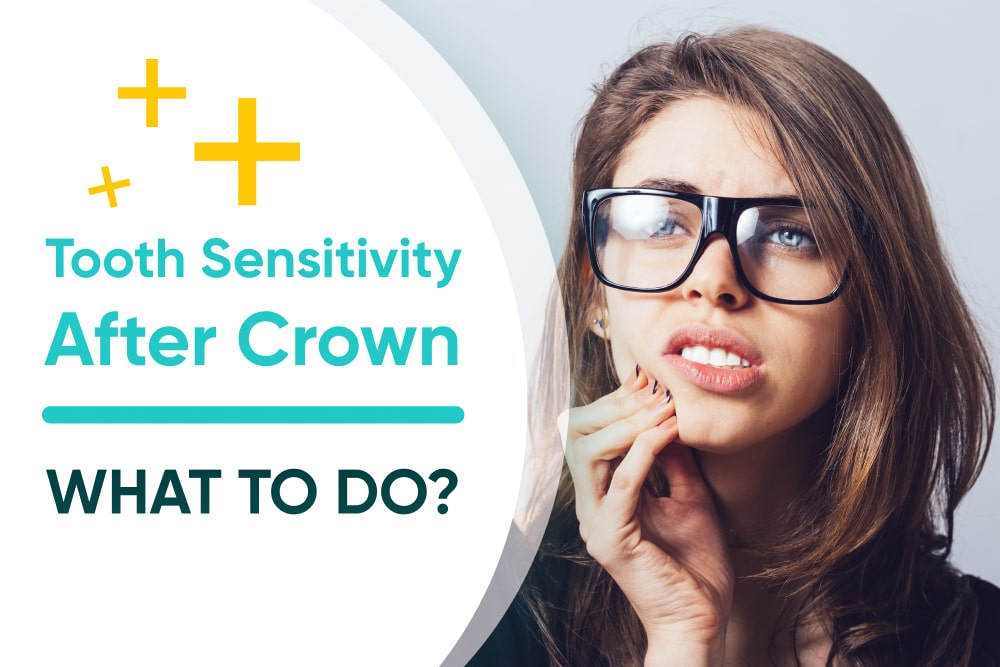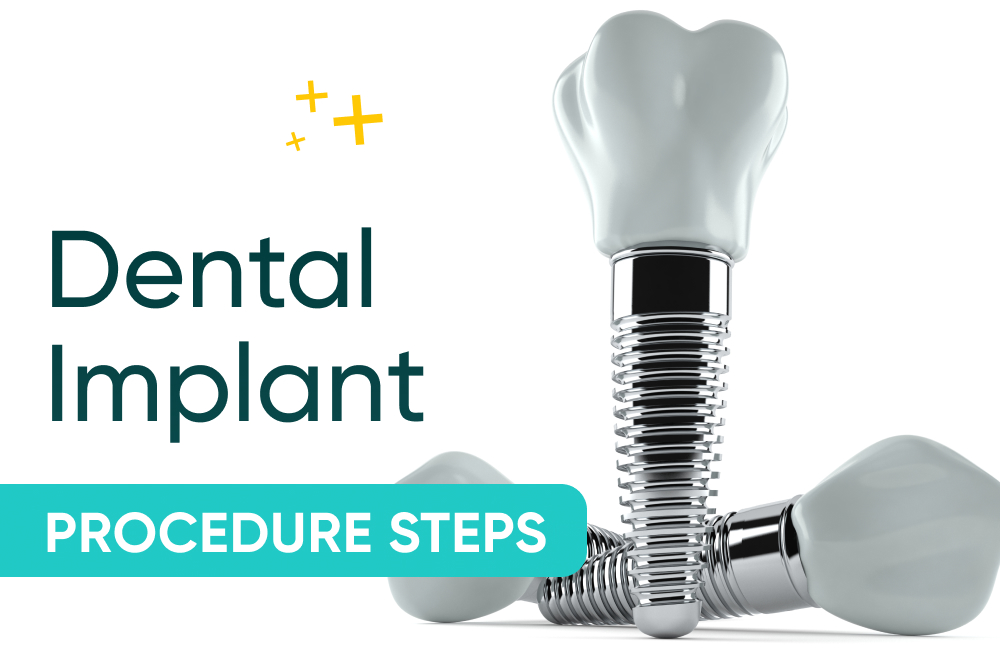If you recently got a dental crown and have been experiencing tooth sensitivity, you’re not alone. This is because many people encounter sensitivity issues after getting a crown.
Let’s explore the reasons behind tooth sensitivity after crown placement and how long it may last. Additionally, we’ll share effective ways to manage and alleviate oral discomfort.
Can your tooth be sensitive after a crown?
Dentists use dental crowns or caps to restore damaged or decayed teeth. As such, these provide strength and protection to weakened teeth.
These crowns are typically made from materials such as:
- Porcelain
- Metal
- A combination of both
Why is my crown sensitive to cold? While dental crowns enhance the tooth’s function and aesthetics, they can sometimes lead to tooth sensitivity.
Tooth sensitivity after crown placement is not uncommon and can cause discomfort for most people. This sensitivity often manifests when the crowned tooth is exposed to extreme temperatures.
The heightened sensitivity can be attributed to several factors, which we’ll explore further:
1. Proximity of the crown to the nerve
The structure of a tooth comprises an outer protective layer called enamel. Next is a layer called dentin. Afterward, a central pulp chamber containing the tooth’s nerve and blood vessels.
A dental crown encases the entire visible portion of the tooth above the gum line, including the enamel and dentin. Despite the protection it offers, its close proximity to the nerve can make it more susceptible to temperature changes. Thus, a new crown sensitive to cold can be possible.
The nerve is highly sensitive to hot and cold sensations. As a result, it may respond to these stimuli more acutely with a crown.
2. Exposed dentin
Another contributing factor to tooth sensitivity is exposed dentin. Dentin is the layer beneath the enamel. Moreover, it contains microscopic tubules that lead to the nerve in the pulp chamber.
The dentin can be exposed when the tooth’s enamel wears down due to:
- Tooth decay
- Grinding your teeth
- Acidic erosion
Dentin exposure leaves the nerve endings vulnerable to external stimuli. This can trigger sensitivity after a filling when drinking or eating hot or cold food.
A dental crown does protect the damaged tooth. However, it may not fully shield the exposed dentin. As a result, you may feel more sensitive when the tooth is subjected to hot or cold substances.
3. Adjustment period
Additionally, it’s important to note that the crowned tooth may require an adjustment period. During this time, the surrounding tissues and nerves may respond to the changes. As such, it can cause temporary sensitivity.
In most cases, this sensitivity is a natural part of the healing process. It should gradually diminish as the tooth adjusts to the new crown.
How long does tooth sensitivity last after a crown?
The duration of tooth sensitivity after dental implants can vary from person to person.
Some individuals may experience sensitivity for only a few days. Meanwhile, others might endure it for several weeks or months.
The timeline for sensitivity resolution depends on various factors, including:
1. Initial sensitivity
In the immediate aftermath of dental crown placement, patients tend to experience heightened sensitivity. This is because the tooth and surrounding tissues may need time to adapt to the changes.
During this period, you may notice increased sensitivity to hot or cold food or drinks. This is usually temporary and should begin to diminish within the first few days or weeks.
2. Adjustment period
The adjustment period is a critical phase in which the tooth and the surrounding tissues gradually adapt to the crown. Consequently, sensitivity may be at its peak at this time.
The crowned tooth may feel more sensitive to temperature changes, pressure, and biting.
However, as the days pass, the tooth typically becomes less reactive. Ultimately, the discomfort should gradually subside.
3. Individual factors
As with many aspects of oral health, individual factors affect how long a tooth is sensitive after a crown. Some people tend to have a higher sensitivity threshold. As such, they may not notice the discomfort as much as others.
Additionally, the type of dental crown used can influence sensitivity levels. For example, metal crowns may conduct temperature changes more efficiently than ceramic crowns. As a result, it can potentially impact the duration and intensity of sensitivity.
4. Dental health before crown placement
Your tooth’s condition before crown placement can also influence sensitivity. With significant decay or damage, the dental pulp may have already experienced inflammation or trauma.
In such cases, the nerve might take longer to settle down. As a result, you may experience prolonged sensitivity.
Conversely, if the tooth was relatively healthy before crown placement, the sensitivity may resolve more quickly.
5. Proper dental care
Maintaining excellent oral hygiene can positively impact the duration of sensitivity. Keep your tooth healthy and less sensitive during the healing process. You should practice regular brushing, consistent flossing, and routine dental checks.
Managing sensitive tooth after crown
Dealing with tooth sensitivity after getting a dental crown can be uncomfortable. Fortunately, there are practical steps you can take to manage the discomfort:
1. Avoid extreme temperatures
Steer clear of extremely hot or cold foods and beverages. Also, opt for lukewarm or room-temperature alternatives.
2. Use toothpaste for sensitive teeth
Consider using toothpaste specifically formulated for sensitive teeth. These toothpaste products contain ingredients that help alleviate sensitivity.
They do this by forming a protective barrier over the exposed dentin. Additionally, they block the tubules that lead to the nerve.
3. Maintain excellent oral hygiene
Adopting a robust oral hygiene routine is essential in managing crown sensitivity. You must brush gently but thoroughly at least twice a day. Also, consider using a soft-bristled toothbrush.
Additionally, floss daily to remove plaque and debris from between your teeth and around the crown.
4. Be mindful of your diet
You should also be cautious with your diet. Steer clear of acidic and sugary foods and drinks, as these can erode enamel. As a result, they increase the risk of sensitivity.
Moreover, opt for a tooth-friendly diet rich in fruits, vegetables, and dairy products.
5. Consider desensitizing agents
Your dentist may recommend desensitizing agents to apply directly to the crowned tooth. These agents work to reduce nerve sensitivity. As a result, they can provide relief from discomfort.
Make sure to follow your dentist’s instructions on the application for optimal results.
6. Consult your dentist
Call your dentist for crown sensitivity that persists or becomes bothersome. They can offer additional recommendations based on your specific case.
Plus, they may suggest professional treatments to address the sensitivity effectively.
When to seek professional advice for sensitive crown tooth
Most people only experience temporary crown sensitivity. However, there are situations when seeking professional advice is crucial:
1. Persistent crown sensitivity months after
You must consult your dentist if the crown pain or discomfort persists beyond the initial adjustment period. Another scenario is when the sensitivity becomes increasingly uncomfortable.
Your dentist can
- Assess the crown’s fit
- Check for any signs of infection or damage
- Determine the best course of action to alleviate your discomfort
2. Crowned tooth sensitive to cold with lingering pain
Experiencing lingering pain after consuming hot or cold stimuli is not typical. Additionally, getting tooth sensitivity months after crowns can indicate an underlying issue.
3. Sensitive teeth after crown due to pressure or biting
Sensitivity to pressure or biting can indicate an ill-fitting crown or potential issues with the tooth’s structure.
Seeking prompt professional advice is crucial to prevent further complications.
4. Signs of damage or looseness
You must contact your dentist immediately if you notice damage, cracks, and looseness on your crowns.
Take note that damaged or loose crowns can lead to increased sensitivity. Plus, they require timely repair or replacement.
Frequently Asked Questions
Are crowns sensitive?
Yes, dental crowns tend to be sensitive in the initial period after placement. This can occur when exposed to hot or cold temperatures due to the crown’s proximity to the tooth’s nerve. Also, the presence of exposed dentin can trigger sensitivity.
How long does tooth sensitivity last after filling?
Tooth sensitivity after a dental filling can vary. In most cases, sensitivity may last for a few days or weeks after the dental procedure.
This sensitivity is generally temporary and should gradually subside as the tooth heals.
Should I be worried about tooth sensitivity months after filling?
Experiencing tooth sensitivity for a few months after a dental filling is not uncommon. It tends to occur if the filling was deep or the tooth had significant decay.
Sensitivity can occur as the tooth’s nerve undergoes the healing process. This sensitivity should gradually diminish over time.
However, schedule an appointment with your dentist for a thorough evaluation. Do this if the sensitivity remains persistent or worsens over time. You should also seek a dentist’s attention if it’s accompanied by other symptoms
Your dentist will assess the tooth’s condition and determine the best course of action to alleviate any discomfort.
Sensitive teeth can be worrying after the procedure, especially with the cost of dental crowns. Nonetheless, listen to your body and consult your dentist when needed.
Can I get permanent crown sensitivity to hot and cold drinks?
Yes, it is possible to experience permanent crown sensitivity to hot and cold drinks. Some individuals may continue to be sensitive to temperature changes in the long term.
This sensitivity can be attributed to various factors, including inadequate bonding, bite alignment issues, and the choice of crown material.
Conclusion
Tooth sensitivity after getting a dental crown is a common concern. While the sensitivity can be discomforting, it is a normal part of the healing process.
As such, understanding the reasons behind crown sensitivity can help you manage the discomfort effectively.
If you don’t know who to turn to, NoHo Family Dental is a trusted team in North Hollywood. We can help you find the underlying issue and work toward the best course of action.




